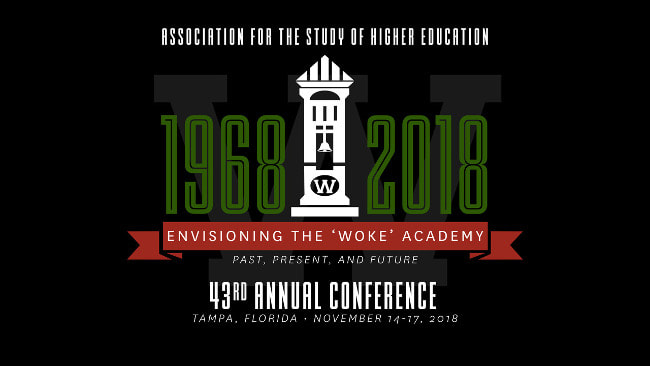|
School of Education faculty and students present at the 43rd annual conference of the Association for the Study of Higher Education (ASHE) in Tampa, Florida, November 15-17.
ASHE brings together "faculty, scholars, administrators, and students who work in higher education, public policy, or a related field; those who work within and across such disciplines as education, public policy, economics, history, philosophy, political science, psychology, and sociology; and those in state and federal agencies, philanthropic organizations, higher education associations, and other entities that use research to inform policy and practice." The 2018 conference theme is "Envisioning the “Woke” Academy: Past, Present & Future." Presentations (presented alphabetically by title) Title: Revisiting Diversity: On-Campus Inclusion Projects and the Seeds of Organized Resistance Paper Session Event: “There were no beds given to slaves...”: Disrupting Plantation Politics in Search of the Woke Academy Presenters: Cam Owen, Miguel Abad Abstract: Researchers have highlighted the ways in which diversity-driven initiatives incorporate minoritized communities into the university through a process that appropriates and commodifies difference. Scholars argue that these efforts thus obfuscate and sustain systemic oppression. However, common critiques of these initiatives overlook the microprocesses of resistance performed by students, faculty, administrators, and others. Through 30 interviews with 30 left-wing activists who had at one point passed through higher education, the authors illustrate how diversity-driven initiatives (i.e, ethnic studies departments, multi-cultural centers, and non-white student groups) afforded students of color and other minoritized groups opportunities to cultivate a critical understanding of structural inequality and engage in organized resistance for the first time. Rather than discarding the concept of diversity wholesale, the authors argue that engaging with the contradictions concomitant in diversity discourse and initiatives provides scholar activists a theoretical tool to understand how non-dominant groups resist, engage, and imagine possible futurities. Title: Using Multiple Correspondence Analysis to Understand the Implementation of Promising Practices across Instructor Characteristics in Large Undergraduate STEM Lecture Courses Roundtable Event: Assessing Undergraduate Success through Multiple Methodologies Authors: Gabe Avakian Orona, Rachel Baker, Kameryn Denaro Abstract: In this study, we extend an underutilized data-reduction technique, multiple correspondence analysis (MCA), to classroom observations for the purpose of exploring patterns among STEM teaching practices across instructor characteristics. This method maintains the unique advantage over other approaches not only by uncovering groupings of promising practices, but also in its ability to examine associations with variables not included (supplementary) in the computation of dimensions. Our results reveal how this method proved useful for describing patterns of teaching practices. The substantive findings from this descriptive analysis reveal that the implementation of promising practices varies according to instructor rank classification, gender, and school. Implications for the hiring of faculty dedicated to teaching are also considered, as our results speak to how job incentive structures may be important to the implementation of these instructional methods Conference Program Comments are closed.
|
Resources for:
|
|


